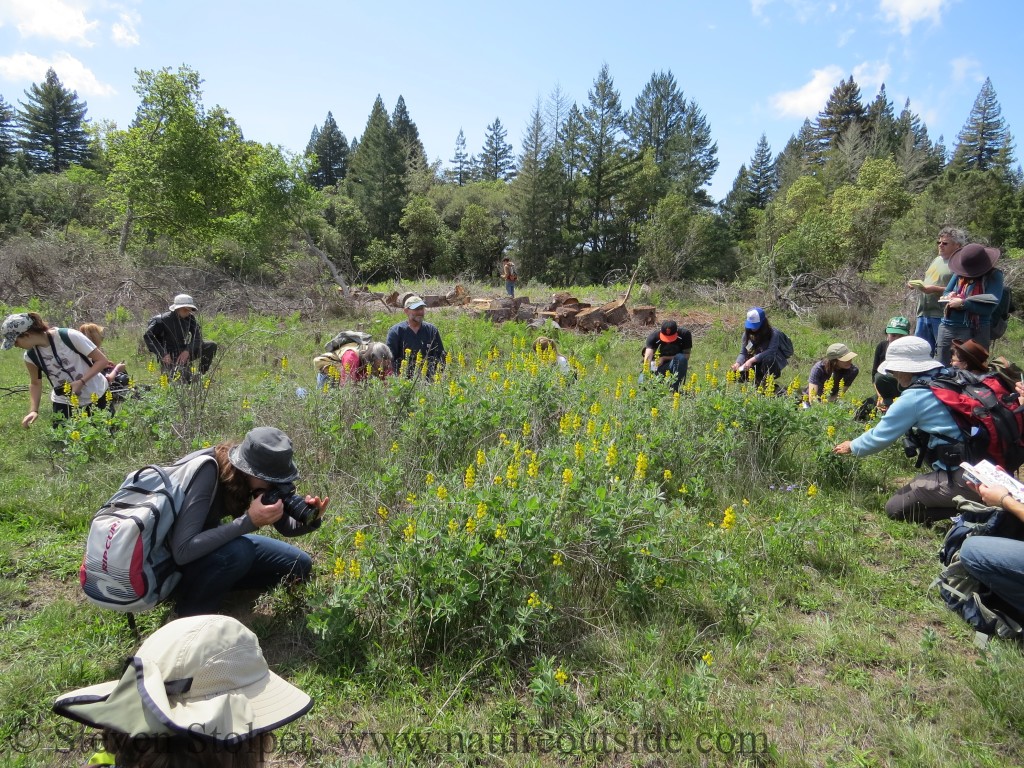
Naturalists in training (False Lupin – Thermopsis)
Did you know that biology students can graduate from college without a single course in identifying organisms? Molecular biology, genetics, computational biology and bioinformatics flourish in today’s universities. But where have the naturalists gone? Who is training those dedicated observers of our natural world?
A naturalist studies the world by observing plants and animals directly. Here are three naturalists who had a major impact on our society.
Charles Darwin
Charles Darwin was perhaps the most famous. His observations led him to formulate the most compelling scientific explanation of how plants and animals attained their current forms.
John Muir
John Muir worked tirelessly to preserve wilderness areas for the American people and their descendants. His efforts led to the formation of Yosemite National Park and Sequoia National Park. He founded the Sierra Club, one of the most important conservation organizations in the United States.
Rachel Carson
Her Landmark Book, Silent Spring, awoke the American public to the environmental impacts of human activity, particularly pesticide use. Her book led to the nationwide ban on DDT and other pesticides. The new policies saved many raptors from extinction in the US.
Why Naturalists are Important to Our Future
Naturalists still play an important role in our society. Their observations help fight infectious diseases that cycle through different species. They identify promising leads for drug research. The data they collect is used to manage fisheries, forests and other natural resources. They serve as a check on the data governmental agencies publish about the health of our environment. Most importantly, naturalists often produce the data that biologists use for their research.
Naturalists also explain nature to the general public. As society deals with environmental issues on both the local and national levels, naturalists will play a crucial role in keeping the public informed.
The Naturalist is an Endangered Species
This post was inspired by an editorial in the journal Nature. New research has documented the steady decline of natural history teaching in all fields of scientific endeavor. I usually link directly to the paper, but the editorial was very interesting reading. I include links to both below.
Paper: Natural History’s Place in Science and Society
You Can Be a Naturalist
Increasingly, we are becoming the naturalists. Citizens with digital cameras, smart phones and a passion for the outdoors are steadily becoming the keen observers of our natural world. I had never even heard the term “citizen science” five years ago.
Programs exist like the California Naturalist Program that train people as naturalists. They charge a modest fee and provide aid for those who cannot afford it. Investigate your area to see if there is a local program you can attend.
As budgets shrink for science of all kind, more scientists scientists are turning to members of the general public to lend a hand with their research. This is an opportunity for bushcrafters! It gives us a chance to use our bushcraft to help others. I recommend you try it if you can. It’s not glamorous work, but it can be fun and rewarding.
I just volunteered to help a researcher understand how smaller carnivores (coyotes, bobcats, foxes) interact with each other in our increasingly fragmented landscape. Since the researcher is primarily interested in analyzing changes in carnivore diet, I expect to be collecting scat. Maybe I will get a chance to exercise my meager tracking skills. Regardless, it promises to be a fun project. And the “office” can’t be beaten!
Share your Thoughts
Have you tried citizen science? Would you consider becoming involved in citizen science? Do you consider yourself a naturalist?
Related Articles on NatureOutside
Mobile Technology and our Wilderness Experience
Archaeology, Technology, and Native Peoples
For fun facts and useful tips, join the free Bushcraft Newsletter.



yes! thanks for the inspirational post. I am considering doing this and this was a great push in the right direction =)
Gerry, programs like the California Naturalist Program are worthwhile and great fun. Let me know what you end up doing.